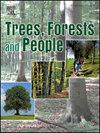是什么激励措施促使小农减少森林砍伐?来自尼日利亚雨林地区的证据
IF 2.7
Q1 FORESTRY
引用次数: 0
摘要
森林砍伐持续破坏了森林在提供环境服务和生计支持方面的关键作用。在尼日利亚等发展中国家,小规模农业极大地推动了森林砍伐。本研究利用来自尼日利亚热带雨林地区克罗斯河州634名小农的数据,分析了农民对减少森林砍伐的激励措施的偏好及其影响因素。采用条件混合过程(CMP)分析农民对财政激励的偏好,采用多项probit模型分析农民对非财政激励的偏好及其影响因素。结果表明,农民对激励措施的偏好存在差异,分别有38%和42%的农民对财政和非财政激励措施有偏好。农民选择的非财政激励措施包括提供农场加工设施、农场投入、青年就业机会和创业培训项目。有趣的是,20%的农民不愿意接受任何激励措施,而是宁愿继续砍伐新的森林。此外,研究结果表明,农民的社会经济和制度因素显著影响了他们对激励措施的选择。我们认为,为农民提供同质激励不一定能解决农业驱动的森林砍伐问题。因此,激励政策应考虑到小农对可持续减少森林砍伐的不同偏好。本文章由计算机程序翻译,如有差异,请以英文原文为准。
What incentives motivate smallholder farmers to reduce deforestation? Evidence from Nigeria's rainforest region
Deforestation has persistently undermined forests' critical role in providing environmental services and livelihood support. In developing countries like Nigeria, small-scale agriculture significantly drives deforestation. This study analyzes farmers' preferences for incentives to reduce deforestation and its influencing factors using data from 634 smallholder farmers in Cross Rivers State, located in Nigeria's rainforest region. The Conditional Mixed Process (CMP) was used to analyze farmers’ preference for financial incentives, while the multinomial probit model was used to analyze farmers’ preference for non-financial incentives and their influencing factors. The results suggest that farmers have differential preferences for incentives, with 38 percent and 42 percent having a preference for financial and non-financial incentives, respectively. The farmers' choice of non-financial incentives includes providing farm processing facilities, farm inputs, employment opportunities for youths and entrepreneurship training programs. Interestingly, 20 percent of the farmers were unwilling to accept any incentives but would rather continue clearing new forest areas. Furthermore, the findings suggest that farmers' socioeconomic and institutional factors significantly shape their choice of incentives. We argue that providing homogenous incentives for farmers may not necessarily address agricultural driven deforestation. Hence, incentive policies should account for the diversity in smallholder farmers’ preferences for sustainable deforestation reduction.
求助全文
通过发布文献求助,成功后即可免费获取论文全文。
去求助
来源期刊

Trees, Forests and People
Economics, Econometrics and Finance-Economics, Econometrics and Finance (miscellaneous)
CiteScore
4.30
自引率
7.40%
发文量
172
审稿时长
56 days
 求助内容:
求助内容: 应助结果提醒方式:
应助结果提醒方式:


